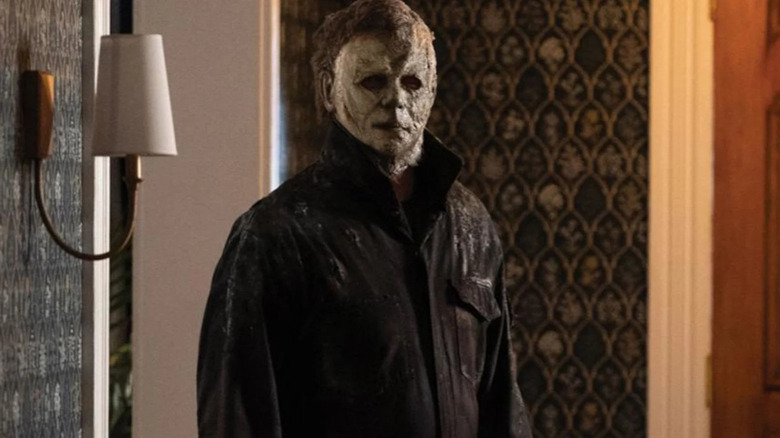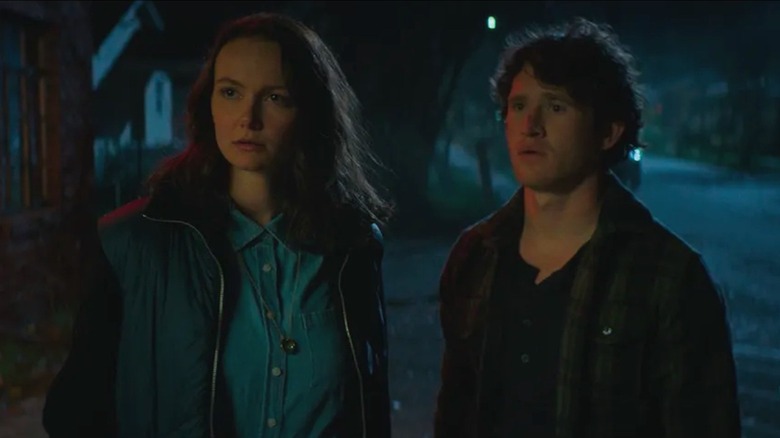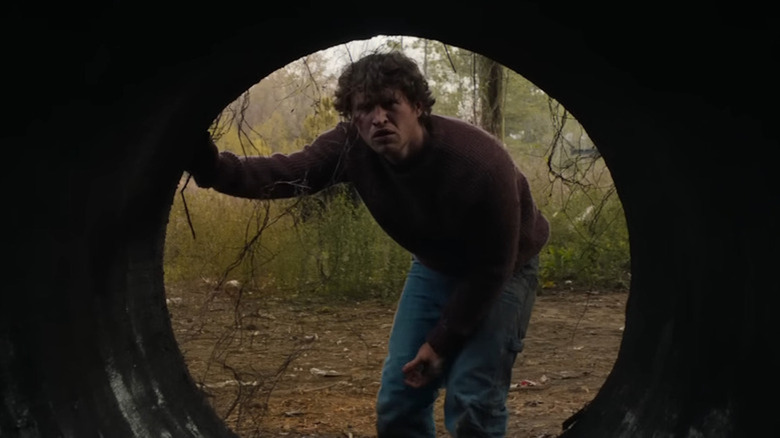David Gordon Green's Halloween Ends Was Inspired By Lost Boys, Twin Peaks, And More
Whatever people were expecting from David Gordon Green's "Halloween Ends," the third and final film in his revival trilogy of John Carpenter's 1978 horror classic, it almost certainly wasn't the strangely subdued film he's delivered. The previous installment, "Halloween Kills," seemed to be setting up one last grudge match between Jamie Lee Curtis' Laurie Strodeand her seemingly unkillable nemesis Michael Myers. After all, the stakes had been raised to a series-high personal level with Michael's murder of Laurie's daughter, Karen (Judy Greer). To me, this would've been a disappointingly pat resolution to Green's new take, which had wiped out every sequel to Carpenter's original and started from scratch. Fortunately, Green felt the same way.
"Halloween Ends" kicks off with a teenage babysitter, Corey Cunningham (Rohan Campbell), accidentally killing his bratty charge, and proceeds, for a shockingly lengthy stretch of the film, to work shockingly well as a young outlaw romance. Green and his co-writers (Danny McBride, Paul Brad Logan and Chris Bernier) are drawing from a multitude of film references here, but one thing they're definitely not doing is making a boilerplate slasher flick. The effect is exhilarating — at least, it is until Green surrenders to the genre's conventions in the final third. You've never seen a slasher like this, and, judging from its C+ Cinemascore, you probably never will again.
A sequel derived from some unexpected sources
In an interview with The Wrap's Drew Taylor, Green acknowledged that "Halloween Ends" owes its existence to a number of movies, some of which aren't straight-up horror:
"There were also I would say things like 'Twin Peaks' and 'My Bodyguard,' there were dramatic work that was equally as inspiring as some of the more obvious, 'Christine,' and 'Lost Boys,' as you say, 'Near Dark,' for sure, which is super underrated. But yeah, it's a transformation movie kind of, and the horror genre can relate to that in so many ways. And then I just tried to make it more of a human version of that, where it wasn't supernatural, it was informed by the context of this community."
You don't have to squint too hard to see the "Twin Peaks" and "Christine" of "Halloween Ends." The bullied Corey's killer kinship with Michael loudly echoes, right down to his last name, Arnie Cunningham's sinister telepathy with the possessed Plymouth Fury in "Christine." "Twin Peaks" is a tad more vague, but Haddonfield's long suppressed resentments bubbling up to the surface due to a series of murders is awfully familiar. But, I'm sorry, did Green just cite Tony Bill's beautiful coming-of-age drama "My Bodyguard"?
Michael Myers as the ultimate bodyguard
"My Bodyguard" was a surprise box-office hit in 1980 that, coincidentally, narrowly outgrossed John Carpenter's "The Fog" (his immediate follow-up to "Halloween") to finish 30th for the year. It stars Chris Makepeace as a meek teenager who gets relentlessly bullied at his new high school in Manhattan. When he tires of getting humiliated by tough kid Matt Dillon, he hires a hulking loner played by Adam Baldwin for protection.
You can certainly read the Corey-Michael relationship as the dark flipside to the Makepeace-Baldwin duo, but it goes a little deeper than that. In "My Bodyguard," we are repeatedly informed by Makepeace's classmates that Baldwin's character is a psychopath who killed his own brother. Later in the film, we discover that he accidentally shot his brother with a pistol, and has been haunted by this ever since. So Corey actually functions as a hybrid of Bill's two main characters. It's a nifty twist, one that I wish Green had played around with a little more. Still, that he bothered with it in the first place, in the context of a slasher movie no less, is tremendously appreciated.


